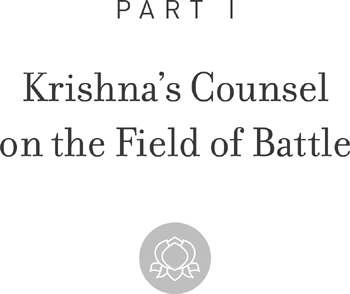As the curtain rises on Chapter One of the Bhagavad Gita, we are at the scene of an impending battle—the fabled battle of Kurukshetra, in the North Indian Kingdom of Kuru. Krishna, the charioteer, and Arjuna, the young warrior, have driven their chariot to the edge of the battleground. Arjuna surveys the scene, and speaks urgently to his charioteer: “I see omens of chaos, Krishna.” As we survey the battlefield in our mind’s eye, we feel—with Arjuna—a visceral sense of foreboding. The narrator has already told us that the forces of light and the forces of darkness are about to collide, and that this battle will tear the fabric of the world.
As early readers of the Gita would have been all too aware, this is indeed no ordinary battle. The battle of Kurukshetra is the definitive struggle of its age. It marks the end of one great mythic era (yuga, or world age) and the beginning of another. The battle of Kurukshetra ushers in the Dark Age—the Kali-yuga—the last of the four great eras foreseen by the Seers of ancient India.
Imagine our two heroes as they prepare for this world-shattering conflict.
Krishna, the charioteer, is dark-skinned and handsome. He is steady. Regal. Unwavering. We’ll find out later, of course, that he is God in one of his many disguises.
Arjuna, our bold warrior, too, is handsome. But not so steady as Krishna. He is young and brash and immature. He is highly prized by his family, and idealized by the common people. He is something of a golden boy. (Do you have one of these in your family? They can be terribly irritating.) There is no doubt, from the very outset, that Arjuna is an exceptionally brave warrior, though he does not yet possess the supernormal powers of the yogi. All that is yet to come.
“Krishna,” says Arjuna as the narrative opens, “halt my chariot between the armies! Far enough for me to see these men who lust for war …”
Arjuna surveys the scene of the impending battle. And what does he see? A sight that undoes him. Arjuna sees his own kinsmen arrayed against him. He sees, as he says to Krishna, “fathers, grandfathers, teachers, uncles, brothers, sons, grandsons, and friends” gathered in the opposing army.
His own family has taken up arms against him? How did we get to this disastrous crossroads?
We need a little background here. The Kingdom of Kuru has been ripped apart by a now-generations-old conflict between two different but closely related lines of the royal family: the Pandavas and the Kauravas. The Pandavas, as you have probably guessed, are Arjuna’s family, and they have come to be known as “the forces of light.” The Kauravas—their conniving cousins—have by this point earned their name as “the forces of darkness.” They have illegally usurped the throne of Kuru, and destroyed the peace and well-being of the people.
As Arjuna surveys the impending conflict between the Pandavas and the Kauravas, he sees “omens of chaos.” He sees the breakdown of the harmony and order of family and kingdom—an order highly prized for the peace and well-being that it fosters. He sees, too, his own family deeply stained by the forces of disorder—by avarice, and the lust for power, land, and fortune. The forces of greed, hatred, and delusion are the destroyers of the world order and purveyors of suffering.
Arjuna, observing all of this, is loath to become part of the pernicious disorder infecting the kingdom. He is reluctant to take his part in this battle, even though it is manifestly his sacred duty.
“Conflicting sacred duties confound my reason!” Arjuna cries to Krishna.
A cry of doubt! Arjuna is split down the middle. How should he act?
As a great warrior, Arjuna has always known that his sacred duty is to fight on the side of “right” in a just war. And according to the rules of war so clearly laid out in the scriptures—rules that are as close to Arjuna as his own heart—this is, indeed, a just war. The peace of the kingdom has been profoundly disrupted by the unjust usurpation of the throne. The forces of greed and disorder have triumphed. The people of the realm will suffer as a result of this unjust usurpation. It is Arjuna’s duty to fight.
And yet. He is confronted with a problem above and beyond the ordinary challenges of war. He sees that his own people are standing against him. Will he kill them? If he does, he will have committed the heinous sin of fratricide, and he will take on the karma of this act, and suffer for many lifetimes to come.
However, if he does not act, he will betray his “code”—the sacred duty that has given his very life meaning.
Arjuna is caught on the horns of a vicious dilemma. “We don’t know which weight is worse to bear,” Arjuna says to Krishna, “our conquering them or their conquering us.”
Arjuna feels the conflict viscerally. “Krishna,” he says:
My mouth is parched,
My body trembles,
The hair bristles on my flesh.
The magic bow slips
From my hand, my skin burns,
I cannot stand still,
My mind reels.”
Arjuna sees clearly that having executed his sacred duty, having slain his own kinsmen, he will not himself be able to go on living: “We will not want to live if we kill the sons of Dhritarashtra assembled before us.”
Arjuna does, perhaps, the most sensible thing possible: He falls to the floor of his chariot.
“I cannot fight this fight,” he cries to Krishna.
And then Arjuna falls silent.
